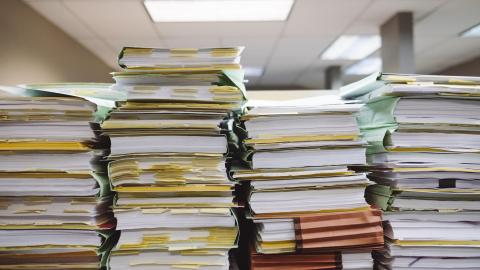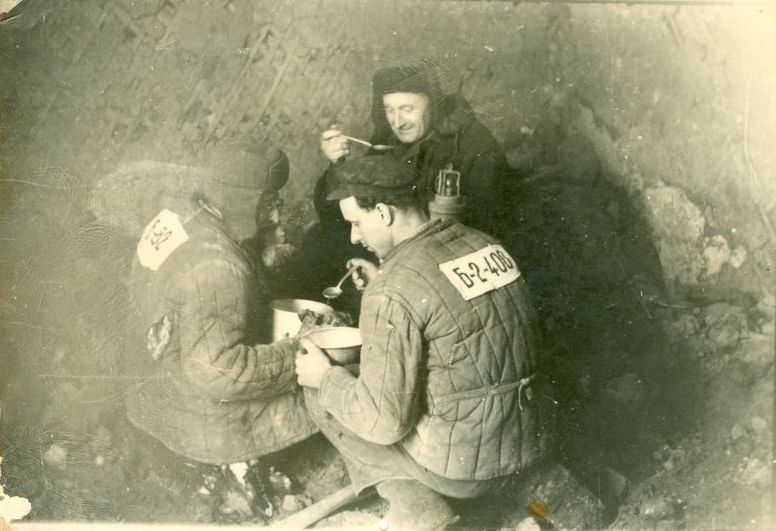Sludge: Americans spend 11.4 billion hours filling out federal paperwork

Credit: Wesley Tingey via Unsplash
- The sludge of paperwork can make it difficult or impossible for people to avoid crushing hardship.
- Whenever the government imposes paperwork burdens, it ought to ask a cost-benefit question.
- Sludge reduction should be a high priority.
Excerpted fromSludge: What Stops Us From Getting Things Done and What to Do About Itby Cass R. Sunstein. Reprinted with Permission from The MIT PRESS. Copyright 2021.
Enacted in 1979, the Paperwork Reduction Act was meant as a deregulatory statute. It was designed to minimize the paperwork burden imposed on the American people and to maximize the benefit of the information obtained. In that way, it was meant to reduce sludge. Its key provision states:
With respect to the collection of information and the control of paperwork, the Director [of the Office of Management and Budget] shall—
(1) review and approve proposed agency collections of information;
(2) coordinate the review of the collection of information associated with Federal procurement and acquisition by the Office of Information and Regulatory Affairs with the Office of Federal Procurement Policy, with particular emphasis on applying information technology to improve the efficiency and effectiveness of Federal procurement, acquisition and payment, and to reduce information collection burdens on the public;
(3) minimize the Federal information collection burden, with particular emphasis on those individuals and entities most adversely affected;
(4) maximize the practical utility of and public benefit from information collected by or for the Federal Government;
(5) establish and oversee standards and guidelines by which agencies are to estimate the burden to comply with a proposed collection of information.
For present purposes, the most important provisions are the italicized (3) and (4). The word minimize suggests that paperwork burdens should be no greater than necessary to promote the agency’s goals. The central idea seems to be one of cost-effectiveness: of two approaches to promoting those goals, the least burdensome must be chosen.
Taking the word minimize together with the phrase maximize the practical utility and public benefit, we can also understand the PRA to suggest a kind of cost-benefit test: The benefits of paperwork burdens must justify their costs. And yet there is no systematic effort, to date, to see which burdens pass that test. Nor is there an opportunity for people to challenge paperwork burdens in court — for example, to get them struck down, in the standard legal parlance, as “arbitrary” or “capricious.”
All this creates serious problems. Many people like deregulation, seeing it as a way of freeing up the economy from pointless restrictions. Many people deplore it, seeing it as a way of eliminating essential safeguards of health and safety. Love it or hate it, it is generally taken to refer to the elimination of the kinds of burdens imposed through regulations that order people to do specific things: reduce air pollution, increase the minimum wage, make cars safer, put graphic warning labels on cigarettes, decrease cancer risks to workers.
Elimination of sludge is not always included in the category of deregulation. It should be. In view of the costs of sludge, material and otherwise, sludge reduction should be a high priority — and it should be able to produce enthusiasm, even a burst of applause, from people who disagree about a great deal else. Whenever the government imposes paperwork burdens, it ought to ask a cost-benefit question. Are those burdens really justified? How much do they help? How much do they hurt? The government should also ask distributional questions: Who, exactly, is being helped, and who is being hurt? Is sludge hurting the most vulnerable members of society?
Is sludge being imposed on people who are poor or desperate, or in some sense struggling?
The PRA requires the Office of Management and Budget to produce an annual report, called the Information Collection Budget (ICB) of the US government. The ICB quantifies the annual paperwork burden that the US government imposes on its citizens. The 2017 report found that Americans spent 11.4 billion hours on federal paperwork. The number has been growing over time.
It is worth pausing over that 11.4-billion-hour figure. Suppose that we assembled every resident of Chicago, and insisted that for the entirety of a year, each one must work forty hours a week, engaged in just one task: filling out federal forms. By the end of the year, the 2.7 million Chicagoans will not have come anywhere close to the annual paperwork burden placed on Americans.
The 11.4 billion hours take a significant toll. If we value an hour of work at twenty-seven dollars, we are speaking of the equivalent of $307.8 billion — more than quadruple the budget of the Department of Education, about six times the budget of the Department of State, and about ten times the budget of the Department of Energy. We have seen enough to know that the monetary figures greatly understate the problem. Sludge can make it difficult or impossible for people to avoid crushing hardship.
What are we going to do about that?




